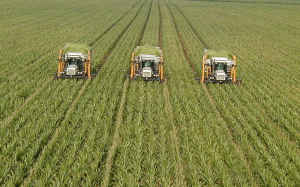by Staff
The UAE controls more than 2,800 square kilometers in farms in Sudan as a result of its decision to invest in agricultural projects in fertile Arab nations to slash its soaring food import bill, according to a Sudanese official.
The farms, scattered over Khartoum, Jazeera, Nile and other arable provinces in the East African Arab country, are more than triple the area of Bahrain and account for nearly 3.5 per cent of the UAE's total area.
Figures by the Khartoum-based Arab Organization for Agricultural Development showed those farms exceed the UAE's total cultivated areas, estimated at around 3.1 per cent of the country's area of 81,000 square kilometers.
Quoted by the semi official UAE daily Alittihad, a Sudanese embassy official in Abu Dhabi said the UAE is the largest Gulf investor in farm projects in Sudan, controlling around 700,000 acres (4,832 square kilometers). The farms account for nearly 58 per cent of the 1.2 million acre farming ventures owned by the Gulf Cooperation Council (GCC), which groups the UAE with five other Gulf nations.
"The UAE's farm investments in Sudan are the largest among the GCC investments in agricultural projects," said Muneera Abdul Halim, an economic adviser at the Sudanese Embassy in the UAE.
She said the Zayed farm project is among the first and largest agricultural venture launched by the UAE in Sudan, with investment of around $60 million.
The UAE, Saudi Arabia and other Gulf nations decided in 2008 to invest abroad in farming projects given their arid desert nature following a surge in global food prices that were among the main drivers of soaring inflation in the region.
The six members are among the largest food importers in the world, with their combined farm import bill exceeding $20 billion in 2009.
AOAD data showed the GCC's cumulative farm imports exceeded $75 billion during 2005-2009, accounting for around 41 per cent of the total Arab food import value of $180 billion although the population of the six members of around 36 million formed only about10 per cent of the total Arab population.
GCC and other Arab officials have repeatedly voiced concern about the farm gap and growing reliance on food imports, mainly from the US and other Western countries. Some officials considered such reliance as a risk to their security.
According to AOAD, a key Arab League establishment, most regional nations are suffering from slackening farm exports and rapid growth in the population, leading to a steady increase in their imports of food products.
It said the surge in exports had created a massive food gap of more than $180 billion over the past 10 years to turn the region into the biggest single food buyer.
In a recent study, a key Saudi investment firm said the GCC's decision to invest in farming projects in Sudan and other countries constitutes a turnaround in their policies to achieve food self sufficiency, describing it as unrealistic goal.
NCB Capital said the policy shift means the GCC nations, which control nearly 45 per cent of the world's proven oil wealth, will rely more on food imports but such projects will allow them to overcome natural constraints at home.
"The GCC nations are shifting their agricultural policies away from the nationalistic goal of food self-sufficiency towards more flexible and broad-based efforts to ensure food security. The previous policies were ultimately undermined by acute constraints posed by the natural environment and resources on domestic agriculture," NCB Capital said.
"This shift is translating into greater reliance on imports, outsourced agriculture and a greater focus on dry agriculture. Farming does not represent a significant component of the GCC economies as an exceptionally arid climate and low capital investments have limited its contribution to GDP and employment."
Muneera said Sudan, long dubbed the "Arab and African food basket", had massive arable land, estimated at nearly 100 million hectares, accounting for around 48 per cent of the total Arab cultivated areas. It also has around 130 million hectares of pasture areas and over 135 million heads of livestock.












